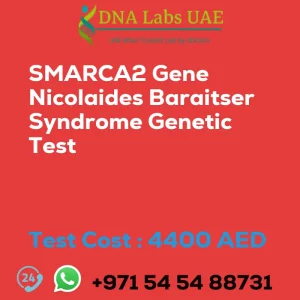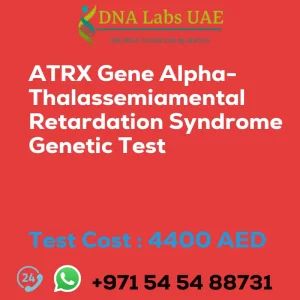UQCC2 Gene Mitochondrial Complex III Deficiency Nuclear Type 7 Genetic Test
At DNA Labs UAE, we offer the UQCC2 Gene Mitochondrial Complex III Deficiency Nuclear Type 7 Genetic Test. This test is designed to diagnose individuals with suspected Mitochondrial Complex III Deficiency, Nuclear Type 7 and provide valuable information for carrier testing, prenatal testing, and genetic counseling for families with a history of this disorder.
Test Components
The UQCC2 Gene Mitochondrial Complex III Deficiency Nuclear Type 7 Genetic Test includes the following components:
- Price: 4400.0 AED
- Sample Condition: Blood or Extracted DNA or One drop Blood on FTA Card
- Report Delivery: 3 to 4 Weeks
- Method: NGS Technology
- Test Type: Dysmorphology
- Doctor: Pediatrics
- Test Department: Genetics
Pre Test Information
Prior to undergoing the UQCC2 Gene Mitochondrial Complex III Deficiency Nuclear Type 7 Genetic Test, it is important to provide the clinical history of the patient. Additionally, a genetic counseling session may be conducted to draw a pedigree chart of family members affected by UQCC2 Gene Mitochondrial Complex III Deficiency, Nuclear Type 7.
Test Details
The UQCC2 gene is associated with a mitochondrial disorder known as Mitochondrial Complex III Deficiency, Nuclear Type 7. This disorder affects the function of Complex III, a protein complex involved in the electron transport chain in mitochondria.
NGS (Next-Generation Sequencing) Genetic Test is a type of genetic testing that utilizes advanced sequencing technology to analyze multiple genes simultaneously. In the case of UQCC2 gene testing, NGS can identify any mutations or variations in the UQCC2 gene that may be causing or contributing to Mitochondrial Complex III Deficiency, Nuclear Type 7.
The UQCC2 Gene Mitochondrial Complex III Deficiency Nuclear Type 7 Genetic Test can assist in diagnosing individuals with suspected Mitochondrial Complex III Deficiency, Nuclear Type 7. It is also useful for carrier testing, prenatal testing, and genetic counseling for families with a history of this disorder.
The test involves collecting a sample of DNA, typically through a blood sample, and analyzing it in a laboratory using NGS technology. It is important to note that genetic testing for mitochondrial disorders, including UQCC2 gene testing, may not always provide a definitive diagnosis or predict the severity or progression of the disorder. Therefore, genetic testing should be done in conjunction with other clinical evaluations and assessments by healthcare professionals specialized in mitochondrial disorders.
| Test Name | UQCC2 Gene Mitochondrial complex III deficiency nuclear type 7 Genetic Test |
|---|---|
| Components | |
| Price | 4400.0 AED |
| Sample Condition | Blood or Extracted DNA or One drop Blood on FTA Card |
| Report Delivery | 3 to 4 Weeks |
| Method | NGS Technology |
| Test type | Dysmorphology |
| Doctor | Pediatrics |
| Test Department: | Genetics |
| Pre Test Information | Clinical History of Patient who is going for UQCC2 Gene Mitochondrial complex III deficiency, nuclear type 7 NGS Genetic DNA Test. A Genetic Counselling session to draw a pedigree chart of family members affected with UQCC2 Gene Mitochondrial complex III deficiency, nuclear type 7 NGS Genetic DNA Test gene UQCC2 |
| Test Details |
The UQCC2 gene is associated with a mitochondrial disorder called Mitochondrial Complex III Deficiency, Nuclear Type 7. This disorder affects the function of Complex III, a protein complex involved in the electron transport chain in mitochondria. NGS (Next-Generation Sequencing) Genetic Test is a type of genetic testing that uses advanced sequencing technology to analyze multiple genes simultaneously. In the case of UQCC2 gene testing, NGS can identify any mutations or variations in the UQCC2 gene that may be causing or contributing to Mitochondrial Complex III Deficiency, Nuclear Type 7. The NGS Genetic Test for UQCC2 gene can help diagnose individuals with suspected Mitochondrial Complex III Deficiency, Nuclear Type 7. It can also be used for carrier testing, prenatal testing, or genetic counseling for families with a history of this disorder. The test involves collecting a sample of DNA, typically through a blood sample, and analyzing it in a laboratory using NGS technology. It is important to note that genetic testing for mitochondrial disorders, including UQCC2 gene testing, may not always provide a definitive diagnosis or predict the severity or progression of the disorder. Genetic testing should be done in conjunction with other clinical evaluations and assessments by healthcare professionals specialized in mitochondrial disorders. |








